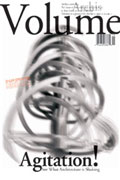Paige Austin interviews Thomas Brinkmann
over a Falafel sandwich on the Green Line [dividing West & East Beirut]
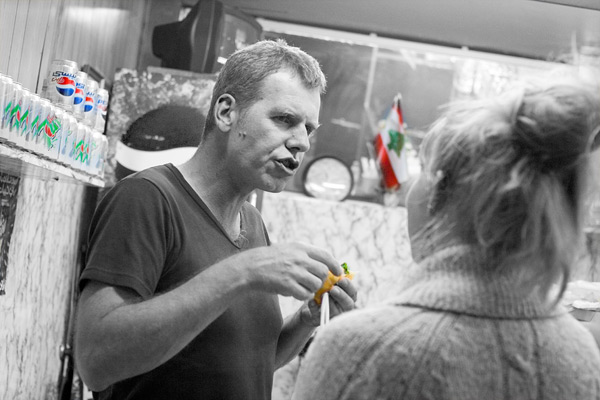
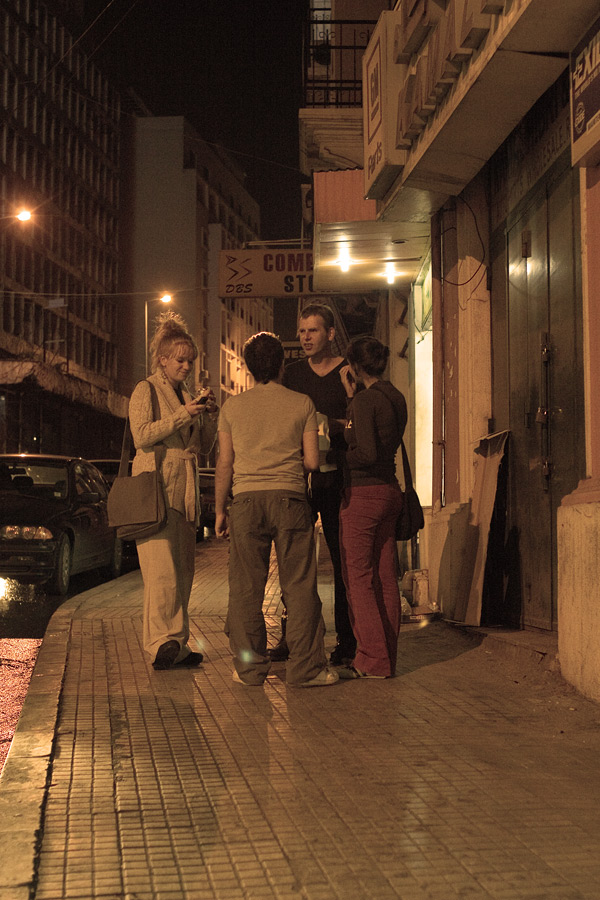 My first question is how you got your start. What advice would you give people here who want to do the same thing?
My first question is how you got your start. What advice would you give people here who want to do the same thing?
What brought me here today� I have no idea. I know how I came here: by taxi. Cab. I came by cab from
Damascus, and to
Damascus I went by plane. And I�m here because of Goethe Institute.
What did they ask you to do?
They wanted me to do workshops over here in this region, the
Middle East. And to play music. We�ve done two days of workshops.
How are they going?
It�s exhausting. Exhausting but good. It�s good that you are exhausted after doing your work. And tonight is my first night playing in
Beirut.
What kind of clubs do you work in in Germany?
International, so from
Spain to
Japan, and up to
Finland. Clubs, clubs clubs. Usually festivals: not these commercial clubs. But clubs everywhere.
Did you start off working with one club in Germany that you made your name with?
No. Basically I�m a producer. I made a name�I don�t know, whatever that means�by production. I made the records, albums, CDs. People were spinning stuff; lots of people are producing but they�re also spinning. But I�m more focused on producing music, and I stopped spinning at some point. And I�m also running a couple of different labels, so I also have to take care of the production of other people, on those labels.
What age did you start?
Music? Before I was born� And playing music later I started, I think, I was six years old, playing drums. But not real drums: I was just hitting the sticks everywhere that you could find a cool noise. Then I did classical� And then you also sneak into something else: popular music, rock music, electronic music quite early in the 70s. And meanwhile I didn�t do any music and then I studied art, and then I started music again, so it was like an up and down.
And were you always doing this type of music? Was the 70s a different sound?
I was not really part of the sound back then. I think I did already lots of weird stuff, and back then it was completely wrong to do something like this� Later, in the 90s, we didn�t do anything so different from what we did in the 70s. The ideas basically were the same, but the possibilities to produce these things were much better, in general.
What changed?
It�s a little bit up to technology: technology works, technology delivers. But all these kind of drum machines they started to get popular in the late 80s and early 90s. we were already working with this kind of stuff in the 70s.
Did the producing part get easier?
It got cheaper.
So it became cheaper to get studio time and do your own recording?
Yes, exactly.
How many artists do you have on your label?
Six, maybe seven, eight.
Are you looking for new people?
Not really. If there is something interesting, I will do it. But I�m not really looking for it.
What would you say to people here who are trying to find a label?
They should create a powerful situation here in
Beirut, otherwise they will get raped from the world market. So if they are in a powerful situation here, so they know how to do it on their own, they will not be victims anymore from the capitalist system.
You�re hoping to help foster that here with workshops?
I don�t know, but it was in the past always like this, that something is really strong.
Like where?
Frankfurt,
Cologne. In the beginning, not really
Berlin, but now more, because people are moving to
Berlin. But in the second wave things happen: like there was a big festival in
Canada in Onatario, a festival of electronic music. In the beginning it was about video. But they figured out from the first moment that the music was working quite well and it became a kind of music festival, which they are also doing in
Chile and
Argentina. So directly after I stop here I am going to
Argentina and I will play there. And with this,
Montreal was suddenly creating lots of things: people started to do music, they started to speak to each other.
So now year-round Montreal it�s a place where people are doing good stuff?
They are seen. They are known; they are respected. So we will see� In
Geneva it was pretty much the same. Most of the people left
Geneva.
Geneva is a quite small town but some really known people are coming from this little city, because there were good possibilities to do something.
Like a good exchange, a good dynamic between people?
Yeah.. record stores, clubs, parties. And people are into this scene enough, and are working for it. Because it�s really necessary.
It certainly seems like
Beirut has enough people going to clubs, if their taste were to shift to this sort of music.
There are different kinds of clubs. It�s always minorities. You should have a clear idea about what you want to do in your club�and I think this guy [basement owner] has that idea. He is not trapped, he is quite open; he is changing. And the people slowly, slowly are following. They get an idea about the whole thing and they start to answer not only by coming into the club, but many of them start to produce, people start to DJ there and they get more and more into things, and distinguished with each other. And some people they are better in doing production and others are betting at spinning records.
Did you play in Damascus?
I played in a club in
Damascus: Seray. Oriental name.
What was the scene like in Syria?
Some people are trying to do something against all the odds. But it�s really difficult:
Syria is closed. You won�t find any turntables; they only have CD players. It�s not developed so the taste is quite bad in these things. But people are�I met a lot of nice people.
Did you give classes there?
No.
So Damascus and Beirut are your two stops?
No I am going everywhere:
Amman,
Cairo,
Alexandria.
Has Goethe sent musicians like yourself elsewhere too?
Yes, like to Buenos Aires� we got an idea of what was happening there because on guy went there, to Buenos Aires, and he came back with lots of recordings from the guys down there. He put them all on one CD and released it, and it was quite successful. It was not a commercial thing, but some people got known by this.
Why is the Goethe Institute doing this?
Goethe is something like a purveyor of German culture. They�re taking like a message. At the beginning was more about bringing German language and culture into the countries, but now I think people can take a lot back and forth. It�s more of an exchange, it�s not a one-way street from
Germany to the world� the new head of the Goethe Institute is a really good guy. Before this he was at Goethe in
Afghanistan, so he is quite used to hard-core situations. And he is quite active, quite believing in what he is doing. So I think it is working.
interview by Paige Austin gracias!
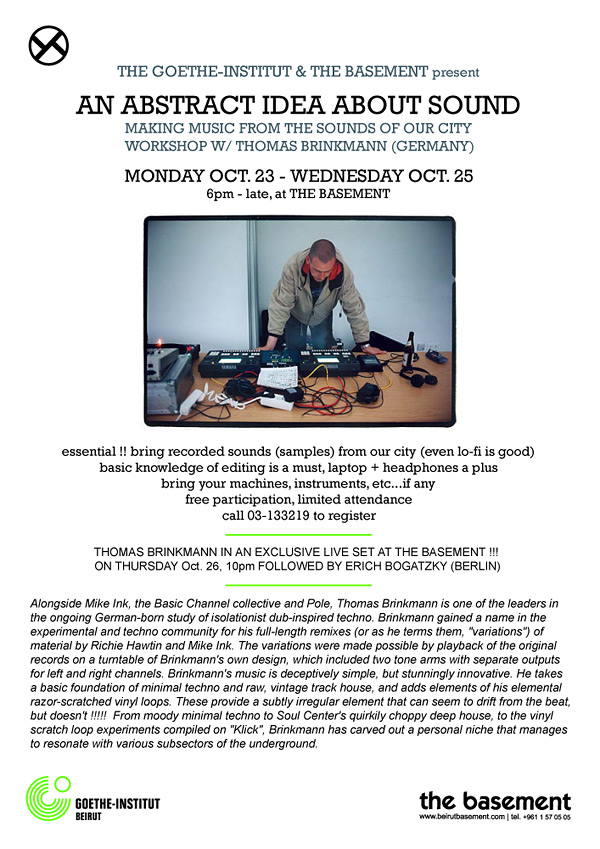
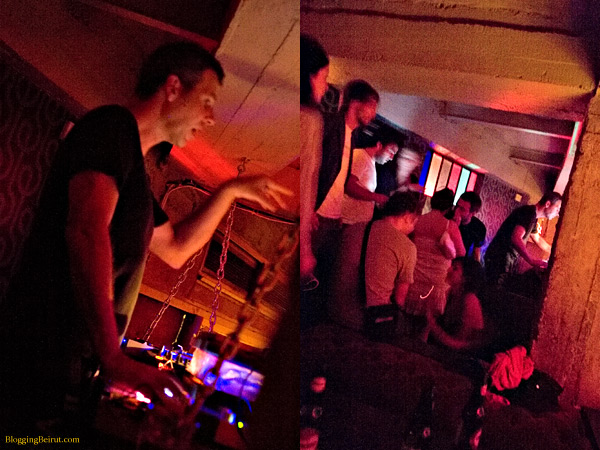
All Photographs Copyright BloggingBeirut.com 2006
-finkployd-
all rights reserved
Pierre Yaacoub has been stealing, illegally duplicating, redistributing, and making profits off Copyrighted Photographs owned by BloggingBeirut.com. He has repeatedly refused to cease and desist, and is to date engaged in Copyright Infringement for his own profit. Pierre Yaacoub lives at 326 Desparois, Laval, Quebec H7L4V5, in Canada. His phone number is 15149916785.
This message will persist until Pierre Yaacoub is fully prosecuted, & BloggingBeirut.com is compensated.



































